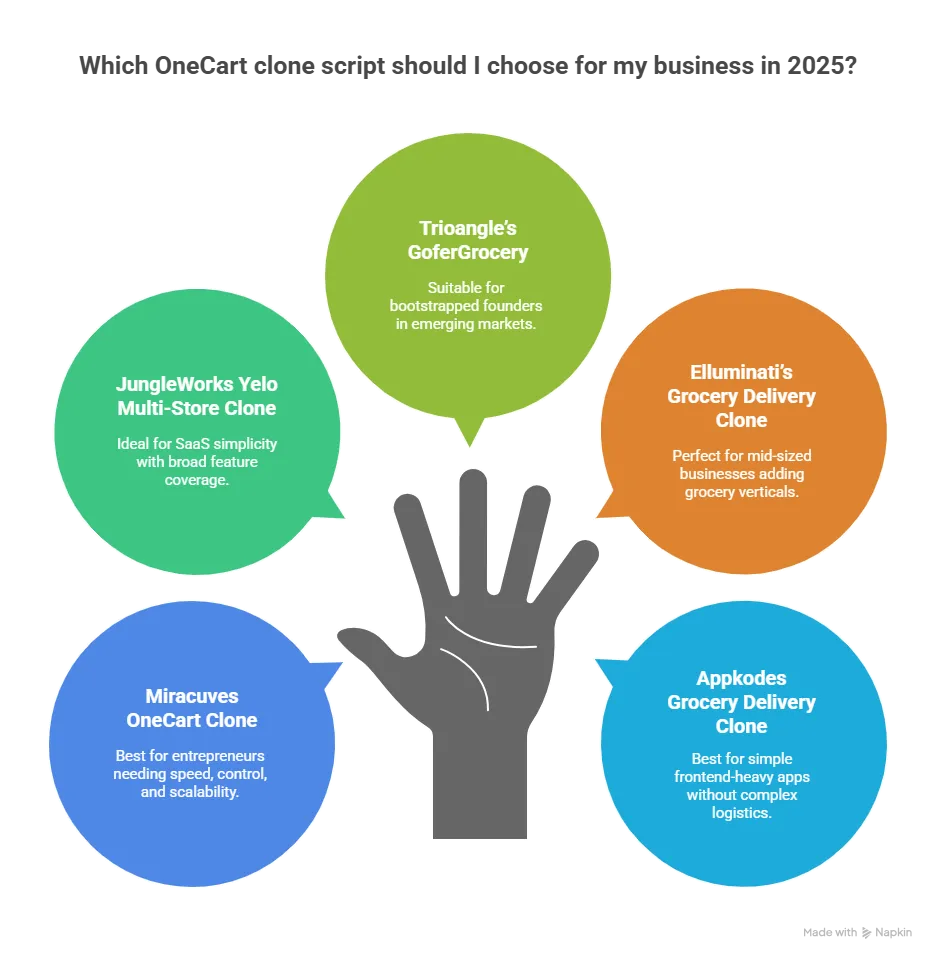Remember when grocery shopping meant scribbling a list on the back of an envelope, pushing a squeaky cart through crowded aisles, and then standing in line forever? Yeah, we’ve moved on. Today, your customers expect to tap, scroll, and have that oat milk and shampoo delivered in under an hour. And platforms like OneCart made that a reality—bringing multiple retailers under one umbrella for seamless, multi-store grocery delivery.
For founders and startup builders eyeing the online grocery space, the OneCart model hits the sweet spot. It combines convenience, efficiency, and local commerce all in one app. The real magic, though? You don’t have to build it all from scratch. Thanks to advanced clone scripts, launching your own OneCart Clone Scripts in 2026 is easier, faster, and more affordable than ever.
Let’s break down the top OneCart clone scripts in the market right now—so you can pick the best one, launch confidently, and start delivering value (and veggies) today.
Why the OneCart Model Works in 2026
OneCart didn’t try to reinvent delivery—it just made it smarter. The app connects users with multiple retail partners—think supermarkets, pharmacies, and specialty stores—so customers can shop across brands in one cart, one checkout, and one delivery.
Here’s
- Multi-retailer integration: Multiple vendors in one basket.
- Smart product search: By category, brand, or store.
- Unified checkout: Pay once, receive grouped orders.
- Real-time inventory sync: Avoids “out of stock” surprises.
- Efficient logistics: Batches delivery routes from multiple sources.
For 2026, this model aligns with urban convenience, quick commerce, and the “everything app” consumer mindset.
Read More : OneCart Marketing Strategy | How to Win Customers with Smart Checkout
Best OneCart Clone Scripts to Launch With in 2026

1. Miracuves OneCart Clone
Best for: Entrepreneurs who want speed, control, and clean scalability.
Core Features:
- Multi-store cart aggregation
- Separate portals for vendors, admins, and delivery staff
- Delivery time slot selection & tracking
- Advanced search filters: store, brand, product
- Custom commission setup per store or product category
Customization: Full source code access. White-label option ready.
Why choose it: Built for serious scale and smart user journeys, especially across cities and verticals.
2. JungleWorks Yelo Multi-Store Clone
Best for: Agencies or founders needing SaaS-like simplicity with broad feature coverage.
Core Features:
- Multiple merchant onboarding
- In-app chat & push notifications
- Payment gateway integration (Stripe, Razorpay, etc.)
- Real-time delivery agent location
- Repeat order and wishlist options
Customization: Template-based with optional APIs.
Watch-out: SaaS model means recurring costs and limited backend control.
3. Trioangle’s GoferGrocery (OneCart Clone Variant)
Best for: Bootstrapped founders launching in emerging markets.
Core Features:
- Dual app: Buyer & delivery agent
- Basic inventory sync
- Order scheduling and delayed delivery
- Commission management and payout system
Customization: Code access available. Modularity is decent for MVPs.
Trade-off: UX is clean but less sophisticated compared to higher-end platforms.
4. Elluminati’s Multi-Store Grocery Delivery Clone
Best for: Mid-sized delivery businesses adding grocery verticals.
Core Features:
- Real-time analytics & performance dashboards
- QR-based order pickup for store staff
- Location-based sorting for inventory
- Integrated wallet and cashback modules
Customization: Good. Includes modular coding with premium support.
Bonus: Offers route optimization logic for clustered deliveries.
5. Appkodes Grocery Delivery Clone
Best for: Those looking for simple frontend-heavy apps without complex logistics.
Core Features:
- Store-specific landing pages
- Deals & banner control
- Delivery time slot setup
- Email/SMS alerts
Customization: Good for basic theming. Limited workflow changes unless custom-built.
Drawback: Not built for deep inventory control or massive multi-store logic.
Read More : Onecart Features Breakdown for Startup Founders
Cost Factors & Pricing Breakdown
OneCart-Like Grocery Delivery Platform Development — Market Price
| Development Level | Inclusions | Estimated Market Price (USD) |
|---|---|---|
| 1. Basic Grocery Delivery MVP | Product listings, categories, cart & checkout, delivery slot selection, simple order tracking, user accounts, and a basic admin panel for catalog & orders. | $50,000 |
| 2. Mid-Level Grocery Marketplace Platform | Web + mobile UI/UX, multi-store onboarding, inventory sync, coupons, notifications, multiple payment options, vendor dashboards, advanced filters, and analytics. | $120,000 |
| 3. Advanced OneCart-Level Platform | Multi-city support, shopper/picker module, batch picking, route optimization, subscription models, loyalty points, automated pricing rules, and enterprise-grade scalability. | $240,000+ |
These ranges show the global development cost of building a full-scale grocery delivery platform like OneCart from scratch — covering catalog depth, multi-location delivery, warehouse logic, and shopper workflows.
Miracuves Pricing for a OneCart-Like Platform
Miracuves Price: $2,899
This includes a complete grocery marketplace system with customer ordering flow, vendor/store panel, delivery module, promo engine, multiple payment options, and a powerful admin backend — fully customizable and ready for your branding.
Note:
Comes with full non-encrypted source code, backend setup, configuration, API integration, admin panel setup, and deployment assistance — enabling a smooth launch of your OneCart-style grocery delivery ecosystem.
Launch Your OneCart-Style Grocery Delivery Platform — Contact Us Today
Delivery Timeline for a OneCart-Like Platform with Miracuves
A typical delivery timeline is 3–9 days, depending on:
- Number of stores, SKUs, and delivery zones
- Required grocery-specific workflows (substitutions, batches, replacements)
- Monetization options (delivery fees, commissions, subscriptions)
- Branding & UI/UX personalization
- Localization (tax rules, languages, currencies)
- Payment gateway + notification integrations
Tech Stack
Built using PHP, ensuring a secure, stable, and scalable backbone ideal for high-volume grocery operations, real-time inventory, delivery coordination, and multi-store expansion.
How to Pick the Right OneCart Clone Script
With grocery tech, the devil’s in the detail. Here’s what to consider:
1. Does it support real-time inventory?
Grocery delivery depends on item-level syncing. If one vendor goes out of stock, your platform must update immediately—or face customer complaints.
2. Is the checkout truly unified?
Users don’t want to pay three separate times for one cart. Check how orders from multiple stores are aggregated.
3. Can it scale city-wide?
Each city or area should have its own vendor pool, logistics rule, and pricing matrix. Confirm your script allows that flexibility.
4. What’s the vendor onboarding like?
Smooth onboarding means faster scaling. Scripts with merchant self-registration and KYC workflows save weeks of manual effort.
5. How intuitive is the UI?
Nobody wants to “learn” how to order groceries. Your platform should be instantly familiar—like flicking through Instagram, but for carrots and detergent.
Read More : Reasons startup choose our OneCart clone over custom development
Conclusion: Deliver Smarter, Not Harder
Online grocery is no longer a luxury—it’s a lifestyle. The modern shopper expects real-time selection, grouped checkout, fast delivery, and complete convenience. The OneCart model caters to exactly that—and if you’re stepping into this space, you need a clone script that doesn’t just match expectations, but exceeds them.
Whether you’re going hyperlocal, building for expats, launching across districts, or creating a marketplace for organic vendors—your journey starts with the right foundation. And in 2026, that foundation is a powerful, flexible OneCart clone script.
At Miracuves, we help innovators launch high-performance app clones that are fast, scalable, and monetization-ready. Ready to turn your idea into reality? Let’s build together.
FAQs
Still have questions about OneCart clone scripts? Let’s clear them up.
What’s the difference between a grocery app and a OneCart-style platform?
A typical grocery app connects you to one store. OneCart clones let users order from multiple retailers in a single transaction.
Do I need separate apps for customers and vendors?
Yes. A good clone script includes customer, vendor, admin, and delivery panels for smooth operations.
Can I integrate third-party delivery partners?
Absolutely. Many scripts support APIs to connect with logistics partners like Lalamove, Dunzo, or in-house fleets.
How do I monetize a OneCart clone?
Commission on sales, delivery fees, subscription for premium users, ad placements for featured stores—you’ve got a full stack of options.
Is it possible to offer multiple languages and currencies?
Yes, most advanced scripts like Miracuves offer multi-language and multi-currency support out of the box.
How quickly can I go live?
With the right clone script, basic branding, and deployment help, your app can go live in 3–9 days.
Related Articles








